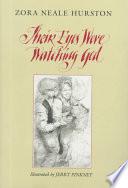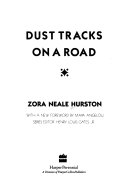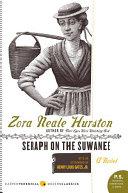“There are years that ask questions and years that answer.”
Source: Their Eyes Were Watching God (1937), Ch. 3, p. 21.
Zora Neale Hurston was an American novelist, short story writer, folklorist, and anthropologist known for her contributions to African-American literature, her portrayal of racial struggles in the American South, and works documenting her research on Haitian voodoo. Of Hurston's four novels and more than 50 published short stories, plays, and essays, she is best known for her 1937 novel Their Eyes Were Watching God.
Hurston was born in Notasulga, Alabama, and moved to Eatonville, Florida, with her family in 1894. Eatonville would become the setting for many of her stories and is now the site of the Zora! Festival, held each year in Hurston's honor. In her early career, Hurston conducted anthropological and ethnographic research while attending Barnard College. While in New York she became a central figure of the Harlem Renaissance. Her short satires, drawing from the African-American experience and racial division, were published in anthologies such as The New Negro and Fire!!. After moving back to Florida, Hurston published her literary anthropology on African-American folklore in North Florida, Mules and Men and her first three novels: Jonah's Gourd Vine ; Their Eyes Were Watching God ; and Moses, Man of the Mountain . Also published during this time was Tell My Horse: Voodoo and Life in Haiti and Jamaica , documenting her research on rituals in Jamaica and Haiti.
Hurston's works touched on the African-American experience and her struggles as an African-American woman. Her novels went relatively unrecognized by the literary world for decades, but interest revived after author Alice Walker published "In Search of Zora Neale Hurston" in the March 1975 issue of Ms. Magazine. Hurston's manuscript Every Tongue Got to Confess , a collection of folktales gathered in the 1920s, was published posthumously after being discovered in the Smithsonian archives.

“There are years that ask questions and years that answer.”
Source: Their Eyes Were Watching God (1937), Ch. 3, p. 21.
“If you are silent about the pain they'll kill you and say you enjoyed it.”
Source: Their Eyes Were Watching God
Variant: Love is lak de sea. It’s uh movin’ thing, but still and all, it takes its shape from de shore it meets, and it’s different with every shore.
Source: Their Eyes Were Watching God
Source: Their Eyes Were Watching God
Source: Their Eyes Were Watching God
“She knew now that marriage did not make love. Janie’s first dream was dead, so she became a woman.”
Source: Their Eyes Were Watching God
“Oh to be a pear tree – any tree in bloom! With kissing bees singing of the beginning of the world!”
Source: Their Eyes Were Watching God
Source: Their Eyes Were Watching God
“No, I do not weep at the world. I'm too busy sharpening my oyster knife.”
How It Feels to Be Colored Me (1928)
Source: Folklore, Memoirs, and Other Writings
Context: I am not tragically colored. There is no great sorrow dammed up in my soul, nor lurking behind my eyes. I do not mind at all. I do not belong to that sobbing school of Negrohood who hold that nature somehow has given them a lowdown dirty deal. Even in the helter-skelter skirmish that is my life, I have seen that the world is to the strong regardless of a little pigmentation more or less. No, I do not weep at the world — I am too busy sharpening my oyster knife.
Source: Their Eyes Were Watching God (1937), Ch. 20, p. 193.
Context: Of course he wasn't dead. He could never be dead until she herself had finished feeling and thinking. The kiss of his memory made pictures of love and light against the wall. Here was peace. She pulled in her horizon like a great fish-net. Pulled it from around the waist of the world and draped it over her shoulder. So much of life in its meshes! She called in her soul to come and see.
Source: Their Eyes Were Watching God
“I love myself when I am laughing… and then again when I am looking mean and impressive.”
Source: I Love Myself When I Am Laughing... And Then Again: A Zora Neale Hurston Reader
“Sometimes, I feel discriminated against, but it does not make me angry. It merely astonishes me.”
How It Feels to Be Colored Me (1928)
Context: Sometimes, I feel discriminated against, but it does not make me angry. It merely astonishes me. How can any deny themselves the pleasure of my company? It is beyond me.
But in the main, I feel like a brown bag of miscellany propped against a wall. Against a wall in company with other bags, white, red and yellow. Pour out the contents, and there is discovered a jumble of small things priceless and worthless. A first-water diamond, an empty spool, bits of broken glass, lengths of string, a key to a door long since crumbled away, a rusty knife-blade, old shoes saved for a road that never was and never will be, a nail bent under the weight of things too heavy for any nail, a dried flower or two still a little fragrant. In your hand is the brown bag. On the ground before you is the jumble it held — so much like the jumble in the bags, could they be emptied, that all might be dumped in a single heap and the bags refilled without altering the content of any greatly. A bit of colored glass more or less would not matter. Perhaps that is how the Great Stuffer of Bags filled them in the first place — who knows?
Source: Their Eyes Were Watching God
“I am crazy about the idea of Democracy. I want to see how it feels.”
"Crazy for This Democracy" in Negro Digest (December 1945).
Context: I accept this idea of democracy. I am all for trying it out. It must be a good thing if everybody praises it like that. If our government has been willing to go to war and sacrifice billions of dollars and millions of men for the idea I think that I ought to give the thing a trial.
The only thing that keeps me from pitching head long into this thing is the presence of numerous Jim Crow laws on the statute books of the nation. I am crazy about the idea of Democracy. I want to see how it feels.
“I accept this idea of democracy. I am all for trying it out.”
"Crazy for This Democracy" in Negro Digest (December 1945).
Context: I accept this idea of democracy. I am all for trying it out. It must be a good thing if everybody praises it like that. If our government has been willing to go to war and sacrifice billions of dollars and millions of men for the idea I think that I ought to give the thing a trial.
The only thing that keeps me from pitching head long into this thing is the presence of numerous Jim Crow laws on the statute books of the nation. I am crazy about the idea of Democracy. I want to see how it feels.
“Some people could look at a mud puddle and see an ocean with ships.”
Source: Their Eyes Were Watching God
“She had waited all her life for something, and it had killed her when it found her.”
Source: Their Eyes Were Watching God
“Those that don't got it, can't show it. Those that got it, can't hide it.”
Variant: If you haven’t got it, you can’t show it. If you have got it, you can’t hide it.
Source: Dust Tracks on a Road (1942), Ch. 12 : My People! My People!
“Research is formalized curiosity.”
It is poking and prying with a purpose. It is a seeking that he who wishes may know the cosmic secrets of the world and they that dwell therein.
Source: Dust Tracks on a Road (1942), Ch. 10 : Research, p. 143.
Variant: There is two things everybody got to find out for theirselves. They got to find out about love and they got to find out about living.
Source: Their Eyes Were Watching God
Source: Their Eyes Were Watching God
“She had an inside and an outside now and suddenly she knew how not to mix them.”
Source: Their Eyes Were Watching God
“She stood there until something fell off the shelf inside her.”
Source: Their Eyes Were Watching God
“A thing is mighty big when time and distance cannot shrink it.”
Source: Tell My Horse: Voodoo and Life in Haiti and Jamaica
Source: Dust Tracks on a Road
“They seemed to be staring at the dark, but their eyes were watching God.”
Source: Their Eyes Were Watching God
“… she starched and ironed her face, forming it into just what people wanted to see…”
Source: Their Eyes Were Watching God
“Mama exhorted her children at every opportunity to "jump at de sun."”
Source: Dust Tracks on a Road (1942), Ch.2 : My Folks, p. 13.
Context: Mama exhorted her children at every opportunity to "jump at de sun." We might not land on the sun, but at least we would get off the ground.
Source: Their Eyes Were Watching God
“It was not death she feared. It was misunderstanding.”
Source: Their Eyes Were Watching God
“You'se something tuh make uh man forgit to git old and forgit tuh die.”
Source: Their Eyes Were Watching God
C. 2, p. 10.
Source: Their Eyes Were Watching God (1937)
“Ships at a distance have every man's wish on board.”
Source: Their Eyes Were Watching God (1937), Ch. 1, p. 9.
“She was saving up feelings for some man she had never seen.”
Source: Their Eyes Were Watching God
“Look lak she been livin' through uh hundred years in January without one day of spring.”
Source: Their Eyes Were Watching God
Source: Dust Tracks on a Road
“anytime you catch folks lying, they scared of something!”
Source: Folklore, Memoirs, and Other Writings
“The sun had become a light yellow yolk and was walking with red legs across the sky.”
Source: Seraph on the Suwanee
Source: Their Eyes Were Watching God (1937)
Context: "Well, Ah see Mouth-Almighty is still sittin' in de same place. And Ah reckon they got me up in they mouth now.""Yes indeed. You know if you pass some people and don't speak tuh suit 'em dey got tuh go way back in yo' life and see whut you ever done. They know mo' 'bout yuh than you do yo' self. They done 'heard' 'bout you just what they hope done happened.""If God don't think no mo' 'bout 'em than Ah do, they's a lost ball in de high grass."
Janie and Phoeby, Ch. 1, p. 16.
Source: Their Eyes Were Watching God
Source: Dust Tracks on a Road (1942), Ch. 14 : Love, p. 203.
Source: Dust Tracks on a Road (1942), Ch. 10 : Research, p. 143
How It Feels to Be Colored Me (1928)


